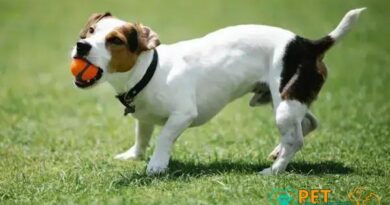What is: Young dog exercise needs
Understanding Young Dog Exercise Needs
Young dogs, often referred to as puppies, have unique exercise needs that are crucial for their physical and mental development. These needs vary based on the breed, size, and individual temperament of the dog. Regular exercise helps to build strong muscles, supports healthy growth, and promotes overall well-being. Understanding what constitutes appropriate exercise for young dogs is essential for any responsible pet owner.
Physical Activity Requirements
Young dogs typically require a significant amount of physical activity each day. This can include walks, playtime, and structured exercise sessions. Depending on the breed, some young dogs may need as much as 30 to 60 minutes of exercise daily. Activities such as fetch, tug-of-war, and agility training can be excellent ways to meet these exercise needs while also providing mental stimulation.
Socialization Through Exercise
Exercise is not just about physical activity; it also plays a vital role in socialization. Young dogs should be exposed to various environments, people, and other animals during their exercise routines. This exposure helps them develop good behavior and reduces the likelihood of fear or aggression later in life. Group classes or dog parks can be ideal settings for socialization.
Age-Appropriate Activities
When considering exercise for young dogs, it’s important to choose age-appropriate activities. Puppies have developing joints and bones, so high-impact exercises should be avoided until they are fully grown. Instead, focus on low-impact activities that promote coordination and balance, such as gentle walks and interactive play that doesn’t put excessive strain on their bodies.
Signs of Overexertion
While exercise is essential, it’s equally important to recognize the signs of overexertion in young dogs. Symptoms such as excessive panting, lethargy, or reluctance to continue playing can indicate that the dog has had enough. Monitoring your puppy during exercise sessions will help ensure they are not pushed beyond their limits, which can lead to injuries or health issues.
Incorporating Mental Stimulation
Young dogs benefit greatly from mental stimulation alongside physical exercise. Engaging their minds can help tire them out just as much as physical activity. Puzzle toys, training sessions, and scent games are excellent ways to provide mental challenges that complement their exercise routines. This combination helps to create a well-rounded approach to their overall development.
Establishing a Routine
Establishing a consistent exercise routine is beneficial for young dogs. Regular schedules help them understand when to expect physical activity, which can reduce anxiety and promote good behavior. Aim for multiple short sessions throughout the day rather than one long session, as young dogs often have bursts of energy followed by periods of rest.
Hydration and Nutrition
Proper hydration and nutrition are crucial components of meeting young dog exercise needs. Always ensure your puppy has access to fresh water, especially after exercise. Additionally, a balanced diet tailored to their age and breed will support their energy levels and overall health, enabling them to engage in physical activities more effectively.
Consulting a Veterinarian
Before starting any exercise program for your young dog, it’s advisable to consult with a veterinarian. They can provide personalized recommendations based on your dog’s specific health needs, breed characteristics, and developmental stage. This professional guidance ensures that you are meeting your puppy’s exercise needs safely and effectively.


